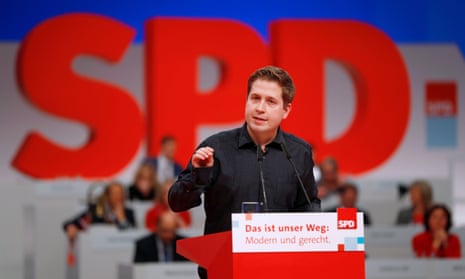He has been described as the babyface politician who holds Angela Merkel’s future in his hands. Some describe him as a “kamikaze” social democrat; others the biggest political talent since Gerhard Schröder.
Kevin Kühnert, a 28-year-old student from Berlin who heads the youth wing of the Social Democrats, is the most talked-about politician in Germany. If he succeeds in his plan to scotch the idea of a Grand Coalition, the fragile construct agreed on last week by Merkel’s conservatives and the left-of-centre SPD, he will simply be the man who turned German politics upside down.
Although presented to the public last Wednesday more or less as a foregone conclusion, the Grand Coalition deal is far from done. Over the next few weeks, the drama surrounding Germany’s most drawn-out coalition talks is set to continue as the SPD’s 464,000 members are invited to vote on the so-called GroKo. Kühnert is the leading face of the #NoGroKo movement, on a mission to prevent what he thinks would be a disaster for both his party and for German democracy. If he succeeds he would make history and potentially bring Merkel’s 12-year reign as Europe’s longest-serving leader crashing down.
“I believe for the SPD to enter yet another coalition with the conservatives [having been in one for eight of the past 12 years] would be very dangerous,” he said in an exclusive interview a day after the putative deal was announced. Merkel ceded key ministry posts to the SPD – including finance, foreign and labour – following marathon talks, and members of the SPD leadership, including its then chief, Martin Schulz, were ecstatic. But not Kühnert, who had earlier tweeted he was “aghast” at the outcome.
“Of course, finance is an absolutely key post in any cabinet,” he said. “But, at the end of the day, the chancellor is still a Christian Democrat and no decision she doesn’t want will get past her or her ministers.”
He accused the SPD negotiators, including Schulz, and his successor as party leader, Andrea Nahles, of being “far too timid in their demands” and not pushing for any truly leftwing policies, such as reducing the taxes of the lower paid and increasing those of the rich. A finance minister, even if he were from the SPD, would fail to push through any of the party’s key principles, he argued. “At the end of the day, it’ll be a Social Democratic finance minister who will be responsible for the fact that the gap between the poor and rich in Germany is only going to get wider because the issue of taxes was barely discussed during the negotiations.”
Kühnert burst on to the political stage following the collapse of the so-called Jamaica coalition talks last month, when the Greens, pro-business Free Democrats (FDP) and Merkel’s conservative CDU-CSU alliance abandoned the idea of forming a coalition. Initially determined that the party, having polled a historical low of 20.5%, could only find its place in opposition, Schulz about-turned and said the SPD was up for negotiations after all.
“We were adamant we didn’t have the mandate to go into government again,” Kühnert said. “Consider too that the coalition as a whole had lost 14% support. The SPD received a lot of recognition when we said we see our role in the next four years as being in opposition. Now I’m afraid that analysis appears to be passé, and I think that’s a huge mistake.”
He is also furious about a lot else when we meet, including the fact that Horst Seehofer of the Christian Social Union, sister party to Merkel’s Christian Democrats, and a staunch opponent to her controversial refugee policies, is set to become interior minister with greater responsibilities. Seehofer calls Hungary’s autocratic leader Viktor Orbán a “friend” and has invited him to speak at party events. “Such a person cannot possibly be the SPD’s political partner,” said Kühnert. “It’s a gruesome concept”. He would simply like to see his party renew itself in opposition.

Sitting in the party’s headquarters, surrounded by portraits of the SPD’s most famous leaders, including Helmut Schmidt and Willy Brandt, Kühnert is aware he is now considered a future leader of the SPD. He also carries an awareness of his party’s historical obligations – Otto Wels, the SPD leader who stood up to the Nazis in a speech to parliament in 1933, is among the portraits – which is why he believes the SPD should be sitting as the main opposition in the Bundestag, rather than the far-right Alternative für Deutschland.
“We have warned against leaving the opposition leadership to the AfD,” he said. “I believe the SPD, in particular, has a historical responsibility not to let that happen.” Last week the SPD saw itself slip down the poll rankings further to 17%, only marginally above the AfD’s 15%. “I fear it’ll only get worse,” Kühnert said.
Last month, at a special party conference in Bonn, at which around 600 SPD delegates narrowly voted in favour of proceeding with the GroKo talks, Kühnert gave a speech stating that anything the CDU and SPD once had in common had been exhausted. “If we were a pub, you might say the CDU is putting its beers on our tab,” he said, coining a phrase which has since been quoted everywhere.
Since the Bonn conference, 25,000 new members have joined the party to enable them to vote, most of them presumed to wish to call time on CDU relations. “We have been inundated with mails and tweets and messages of support from people wanting to help us out,” Kühnert said. “The rise in membership is phenomenal.”
He admits that he greeted Schulz, the former European parliament president, when he was voted the party leader a year ago with 100% support. “I was electrified by the thought that the SPD could become an independent political force again,” he said. That hope was dashed by the election results.
Now, rather than the Schulz Effekt, it is the Kühnert Effekt that everyone talks about. He agrees that, for a party seeking to redefine itself, the rise of Jeremy Corbyn’s Labour has been an inspiration, even more so the performance of Bernie Sanders in the US presidential race. “They have served to prove that social democracy is not a lost cause,” he said.
Regardless of what happens on 4 March, when the results of the postal vote will be announced, Kühnert’s star is unlikely to wane soon. Looking younger than his years, he has a penchant for black-hooded parkas and watching football and curling. A staple on chat shows, he cannot walk down the street without someone asking for a selfie with the man determined to say no to Merkel.
Kevin Kühnert is credited not only with putting the wind up Angela Merkel, but also with rehabilitating the name Kevin, which has a reputation in Germany of belonging to less able children and uncultivated parents.
The rise of the Kev
His parents named him after footballer Kevin Keegan, who played for Hamburg SV between 1977 and 1980. Thousands of Germans have been named after him. But the real Kevin wave came a year after Kühnert’s birth, after the release of the 1990 US film Home Alone – in German Kevin: Allein zu Haus – in which Macaulay Culkin plays Kevin McCallister. Kevin Costner’s fame added to the hype in the 1990s.
A Berlin duo released the song Kevins: “You know things are on the up when we get our first chancellor called Kevin.”
